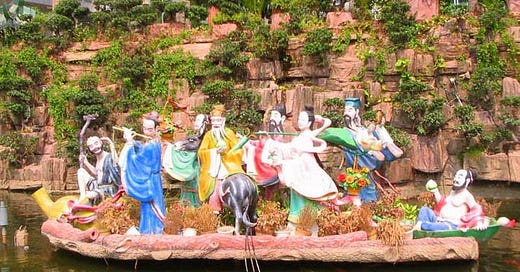The images of the individual immortals in this episode of the Newsletter came from Tianhou Gong (Temple) in Shenzhen, Guangdong. They are depicted there in pairs on the sides of the incinerators used for burning "grave goods."
Ya Got Any Eights?
You can't swing a dead mao (cat) in China without hitting the "lucky number" eight. Its significance may be rooted in a pun: eight in Chinese, ba, sounds a little like "fortune," fa. (Seems like a stretch to me.) Just as likely is geometry or geography: it's the number of corners on a cube (which can define a three dimensional space), and is commonly used on a compass (north, south, east, west, and the four points between).
Whatever the reason, it shows up in the dangedest places. Chinese businesses might be named "88" or even "888." There was an uproar back in the 1990s in a Chinese enclave near Los Angeles when the phone company changed the area code from 818 to 626.
And there's a ton of "eight trivia." Two examples: Sichuan Airlines paid about $280,000US for the phone number "28 8888 8888" back in 2003; and the Beijing Olympics started at 8:08:08 on 8/8/08. You could look it up!
Anyway, all this to say that it's probably no accident that one of China's most popular set of "fairies" is known as the "Eight Immortals."





